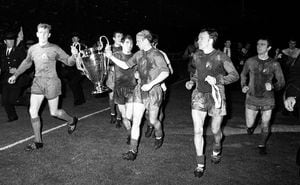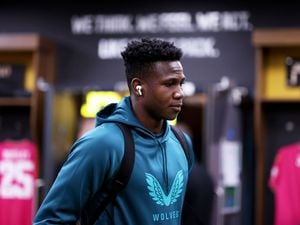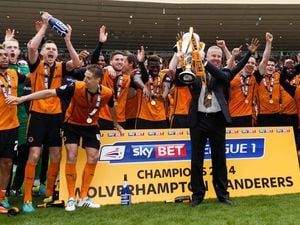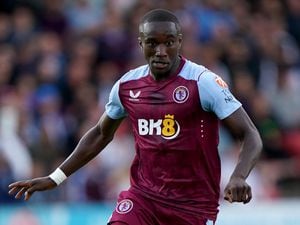Big interview: Alex Stepney
As a 23-year-old Londoner, goalkeeper Alex Stepney was unsure of how to approach the subject of the Munich air disaster when he joined Manchester United in August 1966, but he was soon put at ease.
Matt Busby's men had just won the First Division title to follow up their FA Cup success in 1963 – the first silverware since the tragic incident that claimed the lives of 23 in total (eight players, including Dudley's famous son Duncan Edwards, and three staff members) in 1958.
But there was only one thing on the minds of the manager and his Old Trafford squad, to become European champions in honour of those that perished before them.
"To go and win the European Cup 10 years after Munich was such an unbelievable thing," says Stepney, 77, who was part of the first English side to conquer Europe.
"It's difficult to say – but we did it for them. Every player on that team. We had Bobby (Charlton) and Bill (Foulkes) and Matt (Busby), and we did it for them.
"I joined in '66 and they'd won the FA Cup in '63. Matt wanted to win a trophy and he won it five years after Munich.
"League titles and the European Cup followed. The main thing was the European Cup, and to do it 10 years afterwards was an amazing thing.
"It was the moment of all moments, because we didn't only do it for ourselves, we did it for the club and supporters and the lads that passed away.
"I'd joined the club and we won the league and in those days you had to win the league to get into the European Cup.
"Being a Londoner and going north to Manchester, I wondered whether they ever spoke about Munich, between the players.
"And I knew straight away, the hospitality was fantastic, they greeted you with open arms."
Millwall spotted the promising amateur shot-stopper at non-league Tooting & Mitcham in 1963 and Stepney would spend three seasons as No.1 at The Den.
After relegation from the third tier in his first season, Stepney was an ever-present in back-to-back promotions and was earning rave reviews, so much so that First Division Chelsea swooped to provide competition for Peter Bonetti, who would go on to become a future England team-mate.
But the move didn't work out. Stepney made just one appearance in blue before moving north to become a red for a handsome fee of £55,000. He was earmarked as to replace the late Harry Gregg, another Munich hero, who was struggling with injuries.
For a young man playing third tier football just a few months earlier, it was quite the transformation. Stepney was now sharing a dressing room with George Best, Denis Law and Bobby Charlton, who would all be named World or European Footballer of the Year.
He became an important cog in Busby's side and played a huge role in their success. Stepney is noted for his double save from the great Eusebio late on in the final that United would go on to win 4-1 after extra time.
"We had three European footballers of the year, Best, Law and Charlton," Stepney continued.
"For me to play with three European footballers of the year in one team, and the other lads as well, is a remarkable achievement because it's never happened and it never will again.
"When you first met them they welcomed you with open arms. Matt Busby had a family and you became part of the family. They gave you respect."

As goalkeeper, Stepney quickly found himself as the man tasked with facing the genius of George Best in training.
"George was the most unpredictable guy, what he would do was incredible," the once-capped England man added.
"He would try things out in training. Me being a goalkeeper, and he was all about scoring goals, he'd try things on me.
"I had to do what he wanted me to do and he would score. He'd say 'that's fine' and he'd go out the next day and score it against one of the top teams."
Training with such calibre helped Stepney settle and he was immediately a regular fixture, making 35 appearances as Busby's men claimed the league title by four points from Nottingham Forest.
The title, which would turn out to be United's last for 26 years, set them up for the ultimate target of continental glory the following season.
For sentimental reasons the drive to achieve European success was great and doing so under Wembley's twin towers remains a significant moment in the club's rich history, but Stepney explained how the dream of every working class, starry-eyed youngster was silverware of a domestic kind.
"In your own mind, when I grew up in the '50s as a kid playing with a tennis ball in the streets, was to win the FA Cup and play for England at Wembley," he says.
"There was only about four different games at Wembley in a season, it was the holy grail, now everybody's played there.
"There was no advertisements or sponsorships when I first started. Now it's a business. I was listening to Kevin Pietersen on breakfast TV and he put it right. Each player today is their own business. Whereas we were a team."
Stepney received international recognition but was never able to force his way past Gordon Banks in the England No.1 reckoning. He joined Bonetti and Banks in Alf Ramsay's squad for the 1970 World Cup in Mexico.
He was clearly third-choice, but did make it on to the bench for the quarter-final defeat to West Germany, which Banks missed out through food poisoning.
United's plight thereafter was extreme. Second in the First Division to rivals City in 1968, they finished 11th the following season, midway through which Busby announced his retirement after 24 years.
Under Wilf McGuinness they finished eighth, then eighth again – when Busby returned to steady the ship for the latter half of the campaign. Frank O'Farrell could do no better in 1971/72, with another underwhelming eighth, and he only lasted half of the following season, United just about avoiding relegation with an 18th-placed finish under Tommy Docherty.
But there was no such respite the following year. United were relegated to the second tier for the first time since 1938, just six years after the magic of Wembley against Eusebio and Co.
Stepney, who stayed to help United back at the first attempt and remained No.1 until his final season in 78/79, opts to remember the good times.
He said: "There's always highs and lows but I got through it. I played under five managers, 539 games and won everything apart from the League Cup. That's one of those things."
Still an ardent supporter, he now works in the hospitality section at Old Trafford, providing talks and memories to matchday goers, and is a regular on the after dinner circuit.
He watches most home games and follows football on the television, but is barely able to recognise the modern-day version of the position in between the posts he used to occupy.
"I watch as much as I can but the game has changed," he says. "The world has changed. What goes on now, especially with racism, we never had that. Most of us were British.
"The game is so quick. To put it in perspective we had a manager, assistant manager, trainer and physio. That was it. What is there now? That's how it gone.
"I do watch the goalkeepers, David de Gea, and the other goalkeepers and how it's changed.
"I wouldn't do half the things that they do, because they have coaches. We didn't. If the ball came in the six-yard box and I didn't catch it I wouldn't be playing next week.
"Now they don't catch it, they punch it and put pressure on themselves.
"Peter Schmeichal was brilliant, and Edwin van der Sar, both winning the Champions League. They are the best goalkeepers United have had.
"And you're only as good as what you win."





